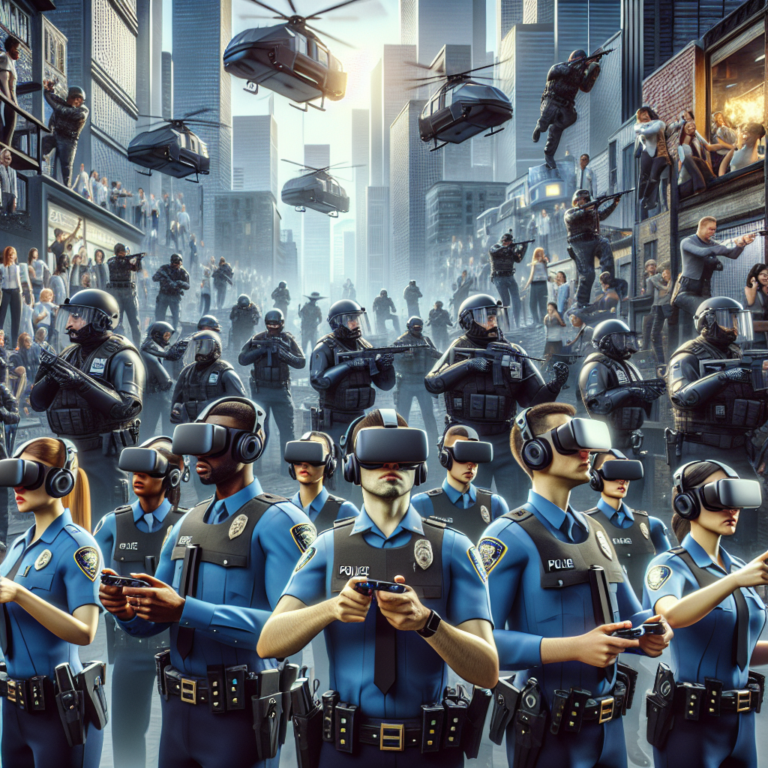Revolutionizing Police Training with Cutting-Edge Virtual Reality Solutions
Law enforcement professionals encounter a variety of difficult and high-stakes situations, particularly when responding to incidents involving armed individuals. Alarmingly, police officers in the United States typically undergo less than six months of training, highlighting the urgent need for enhancements in the training process—this is where virtual reality (VR) steps in.
Integrating VR into police training not only addresses the demand for thorough training in a secure and engaging setting but also aids in the development of critical skills. This immersive technology equips officers to effectively handle a broader range of scenarios, including those that are highly unpredictable and stress-intensive.
In this article, we will delve into the significance of virtual reality in police training, its various advantages, and real-world implementations.
Why Virtual Reality Is a Powerful Training Tool
Virtual reality offers numerous applications within police training, enabling officers to refine their community interactions and develop appropriate responses under controlled settings. By providing immersive experiences that closely mimic real-life scenarios, VR enhances learning and performance beyond traditional training methods. With VR-based training, officers actively engage in a simulated environment that responds dynamically, creating a realistic training atmosphere.
According to a study conducted by Laura Giessing at Heidelberg University, VR can significantly enhance existing training components. It offers officers the opportunity to acquire vital skills and strategies that can be directly applied during critical incidents on duty.
Advantages of VR in Police Training
In addition to fostering skills such as communication, de-escalation, and intervention, VR training promotes empathy. By cultivating empathy, officers can become more effective by understanding the perspectives of individuals they engage with during their duties.
Utilizing VR as a tool for police training presents several key advantages, including:
Enhanced Officer Safety
In their line of work, police officers are often exposed to complex and potentially hazardous situations. Engaging in VR training allows officers to experience these scenarios without the associated risks of physical harm.
Access to Realistic Simulations
Virtual reality is capable of simulating realistic scenarios that provoke reactions akin to those experienced in the real world. This capability allows officers to repeatedly immerse themselves in these simulations, gaining extensive experience before facing comparable situations in actual fieldwork.
Customizable Training Scenarios
One of the standout benefits of incorporating virtual reality into police training is its scalability and customization potential. Training academies and organizations can design tailored scenarios that reflect evolving requirements and align with industry best practices.
Improved Decision-Making Skills
Through exposure to realistic simulations, officers can refine their critical thinking, problem-solving, and communication abilities. VR training can be adjusted to simulate progressively challenging or high-pressure situations, enabling officers to learn effective strategies for handling and de-escalating such scenarios at a comfortable pace.
Emphasis on Evaluation and Debriefing
VR technology can also enhance the learning process by enabling officers to evaluate scenarios critically and conduct thorough debriefing sessions. Users can replay specific situations to analyze and dissect each segment in greater detail.
Real-Life Applications of VR in Police Training
Numerous police departments and organizations around the globe are currently leveraging VR technology to elevate their training programs. Here are some notable examples:
Sacramento Police Department
This department employs immersive video simulators to recreate real-life challenges, offering officers training focused on cultural competency and addressing implicit bias. Additionally, officers receive guidance on making sound decisions and intervening with peers.
Los Alamos Police Department
In 2021, the Los Alamos Police Department initiated the use of VR technology to train officers in effective de-escalation tactics, ensuring they are better prepared for real-world encounters.
Mexico City
Mexico City has established Latin America’s first virtual reality training center for police officers. This innovative facility aims to refine officers’ reflexes during high-risk scenarios, ultimately enhancing their performance during emergencies.
Gwent Police
Gwent Police has implemented a VR training program that instructs officers on responding appropriately and making informed decisions in stressful situations. The program features ten scenarios based on common challenges faced by police officers.
Dutch Police
The Dutch Police have developed a VR simulation game designed to train officers in various scenarios. This training tool also includes bias education, helping officers to become more informed and effectively prevent ethnic profiling during their duties.




0 Comments